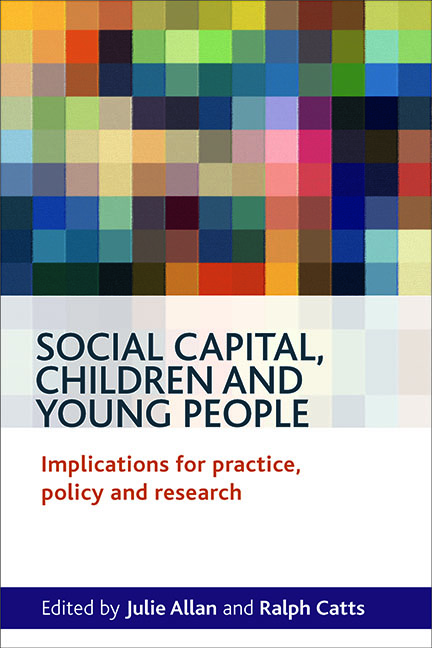nine - Transitions to secondary schooling: a social capital perspective
Published online by Cambridge University Press: 01 September 2022
Summary
Introduction
The transition from primary to secondary school has been identified as of interest, with much research focused on the articulation of the curriculum provision (Galton et al, 2000). Our aim was to explore the experience of transition from the perspective of social capital to see whether this could add to our understanding.
The research was undertaken in two phases over a period of twelve months. The first phase was based in a primary school that was located in an urban area just outside a city centre. The catchment area could best be described as a medium-size working-class estate. Using the National Statistics Socio-economic Classification (ONS, 2004) the majority of the parents had occupations classified as skilled manual or unskilled occupations and some were unemployed. The school was ranked in the second lowest quartile on the Scottish Index of Multiple Deprivation (Scottish Government, 2004). The second phase was undertaken in the secondary school to which the majority of the primary school pupils moved.
Data were collected from students in classroom activities during the final months of primary school and the follow-up occurred near the end of the first year of high school. In both phases, the data included interviews with selected pupils, a class teacher and the head teacher. The views of parents were also sought through a survey in primary school.
Previous research and policy on transition
In published research into the primary to secondary school transition, the major focus has been on the effects of transition on attainment and on the changes in school culture (Galton et al, 1999; Anderson et al, 2000; Demetriou et al, 2000; Galton et al, 2000; Ward, 2000; Topping, 2007). These studies focused on curriculum links and also on links between teachers. An exception was the study reported by Zeedyk et al (2003), which focused on institutional differences between primary and secondary schools which, they argued, risked creating among individual students a sense of helplessness. There are significant differences between primary and secondary school contexts that can be categorised as being to do with structure, philosophy and curriculum focus. These differences may reduce the sense of belonging to both a physical space and a social group (Boyd, 2005). More recently Evangelou et al (2008) concluded that a major concern for young people in the transition to secondary school was developing new friendships and that young people found the experience stressful.
- Type
- Chapter
- Information
- Social Capital, Children and Young PeopleImplications for Practice, Policy and Research, pp. 159 - 180Publisher: Bristol University PressPrint publication year: 2012



